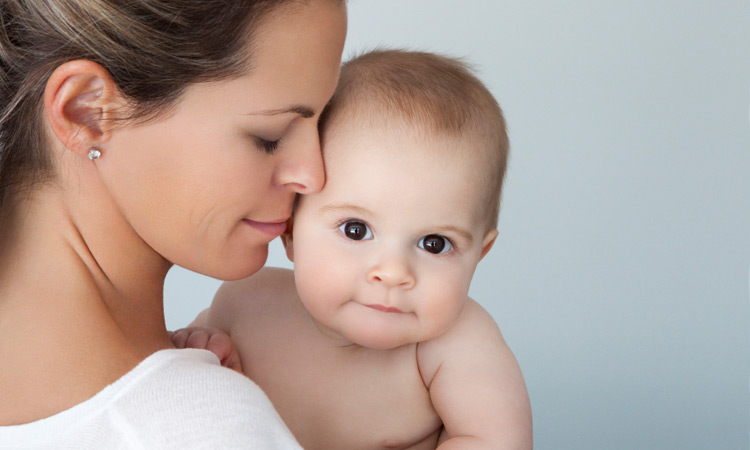 For generations, depressed mothers of infants and young children were overlooked as part of the normal landscape. A mother’s downcast, tearful face and impatience was often called the “baby blues,” and paired in society’s mind with a lack of sleep. But postpartum depression (PPD) poses more complexities than simply finding a way to “cheer up” or muscle through the early part of motherhood. Without treatment, PPD can have harmful effects to both mother and child. It’s important that women with PPD recognize the symptoms, seek help and begin to recover.
For generations, depressed mothers of infants and young children were overlooked as part of the normal landscape. A mother’s downcast, tearful face and impatience was often called the “baby blues,” and paired in society’s mind with a lack of sleep. But postpartum depression (PPD) poses more complexities than simply finding a way to “cheer up” or muscle through the early part of motherhood. Without treatment, PPD can have harmful effects to both mother and child. It’s important that women with PPD recognize the symptoms, seek help and begin to recover.
The symptoms
The signs of PPD don’t necessarily mimic symptoms of typical depression. “Beyond the sadness, many mothers don’t equate the anger, rage and irritability with PPD. They just think they are overtired. Or they think they aren’t meant to be a mom,” Jenna Hatfield, the Online Engagement and Awareness Manager for Postpartum Progress, tells Rewire Me.
Other common PPD symptoms are numbness, apathy toward the child and a lack of desire to bond. Mothers with PPD may experience guilt about having these feelings, and trouble concentrating or sleeping.
After two weeks, hormones from the pregnancy have usually cleared from a woman’s body. Hatfield says that’s the time to begin assessing whether a mother’s feelings are more than just the “baby blues.”
Self-care treatments
Mothers should evaluate their self-care habits, such as nutrition, exercise, relaxation and socialization.
After pregnancy, Dr Kelly Brogan—an NYU faculty member, board certified in Psychiatry/Psychosomatic Medicine/Reproductive Psychiatry and Integrative Holistic Medicine, who practices Functional Medicine—recommends continuing a diet high in natural fats to combat PPD.
Brogan is encouraged by a study that suggests diets sufficient in fatty acids can reduce inflammation, which has been linked to an increased likelihood of PPD. Fish oil can provide a healthy supplement of omega-3 fatty-acids.
Studies have also shown a weakness in the immunity system may be tied to PPD. Thus, Vitamin D may prove a helpful PPD supplement, but more research is needed.
Meanwhile, also try other techniques to reduce cortisol and boost immunity, such as meditation, deep breathing, yoga, tai chi, listening to music, guided imagery or biofeedback. Finding reasons to laugh and creating social connections also reduce cortisol levels.
Moms who spend their day caring for young children often suffer from feelings of social isolation. Communication with other adults is crucial. Friends or family can visit and share chores, or watch the kids to give mothers a few hours away. Occasional babysitters can also provide support.
Socializing can be combined with exercise, another important component of self-care. Brogan suggests interval training, which is good for mitochondria and cardiovascular health. Mothers can join a gym with a daycare for children when they are old enough. Until then, moms can find an exercise partner and walk or run with their kids in jogging strollers.
Hatfield sums up the importance of self-care: “It’s not selfish to take care of yourself by taking 10 minutes longer in shower to breathe. It’s important to the total health of you and your family.”
Professional help and support groups
In a study co-sponsored by Postpartum Progress, data shows more than 20% of mothers suffer from PPD. Yet 40% of those women do not seek medical help because 23-24% experience feelings of embarrassment or guilt, and 25% didn’t think their feelings were serious enough.
“The primary goal of Postpartum Progress is to raise awareness and fight stigma because so many mothers don’t know [PPD] exists,” says Hatfield,
The national organization serves as a resource for mothers who are looking for doctors, mental health professionals or other mothers in their area who are struggling with similar issues.
Postpartum Progress’ website also offers a checklist for mothers to read and evaluate their own symptoms before they speak to a trusted friend, spouse or doctor.
“We also have a public blog where people can ask questions and post comments, but they can fill out this checklist without fear or judgment.” Hatfield explained. “It helps mothers, so they don’t have to say to it all out loud or worry about forgetting.”
Hatfield believes in the importance of positive self-talk. “Because we forget to be gentle with ourselves,” Hatfield explains. Postpartum Progress posts positive self-talk mantras on Instagram.
Hatfield says, “If I could sit down with a mom right now, I’d tell her, ‘She was a good mom for seeking care. Having postpartum depression does not mean you’re a bad mom. Seeking treatment for PPD will make you the mom you want to be.’”
For those struggling with PPD, or who have a loved one with this condition, don’t ignore the symptoms. Seek the love and support you need, and know there are communities of people and professional help trained to guide you through the healing process.
Click here to see Rose’s tips for healthy and happy relationships
Post Disclaimer
This content is for informational purposes only and does not constitute medical advice. Please consult a healthcare professional for any medical concerns.

